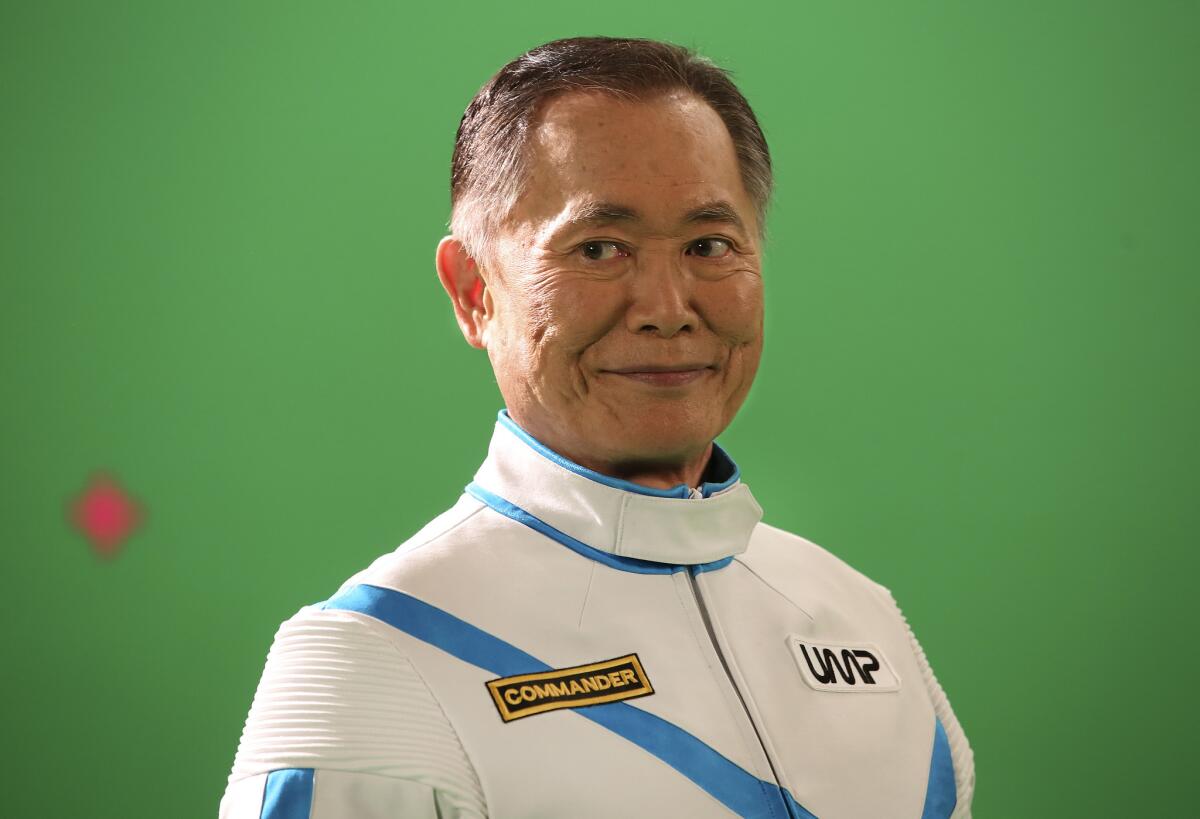Actor-activist George Takei takes command in cyberspace and beyond

George Takei wears a fitted white spacesuit, vinyl boots and stoic expression as he stands before a green screen in a Hollywood production facility.
He’s laser-focused as he faces the cameras, but when he unleashes his lines on a Monday afternoon, it’s clear “Star Trek’s” original Mr. Sulu hasn’t lost his comic flair.
“Enjoy the feeling of dignity and pride that comes with being a space explorer,” he bellows in that unmistakable voice, a deep, mellifluous, almost velvety-sounding baritone. “And, oh — you get to poop into a vacuum cleaner!”
Laughter cuts through the room, and Takei breaks into an elastic grin, his white teeth shining as he surveys his effect on the crew, his own guffaws rising above the din.
Last week he was trying for a very different reaction when he led the charge on behalf of the LGBT community in the heated debates over religious-freedom laws in Indiana and Arkansas. Takei emerged as the face of the entertainment industry on the issue, writing opinion pieces for the Daily Beast and MSNBC, appearing on numerous radio and TV shows, and mobilizing his robust social media followers — a mash-up of Trekkies, Howard Stern fans, LGBT people and other celebrities — into action.
After Indiana Gov. Mike Pence signed the Religious Freedom Restoration Act, Takei called for a boycott of the Hoosier State in a Facebook post that got nearly 85,000 likes.
“We will not visit. We will not spend,” he wrote.
Actors Nick Offerman and Megan Mullally, as well as the band Wilco, canceled upcoming gigs in Indianapolis, adding to the pressure that business leaders put on politicians in Indiana and Arkansas, where a similar law was being considered.
“What Indiana still needs is protection for the LGBT community,” Takei said a day after Pence signed changes in the law that saw the lifting of the #BoycottIndiana charge. “In Indiana, gays and lesbians can be fired from their jobs with impunity, and in Arkansas it’s the same thing. We need those protective laws to truly have an equal society.”
You can bet that Takei, who feels last week’s revisions were only a step in the right direction, will continue to push for equal rights.
And at age 77, with nearly 8.4 million Facebook fans, more than 1.6 million Twitter followers (@GeorgeTakei) and his own YouTube channel, Takei is a social media force to be reckoned with.
------------
FOR THE RECORD
April 7, 10:08 a.m.: An earlier version of this article stated that George Takei has 3.5 million Facebook fans. The number is 8.4 million. The article also referenced Japanese internment camps during World War II. The camps were primarily for Japanese Americans. The article also stated that Takei’s musical “Allegiance” premiered in 2013. It premiered in 2012.
Also, an earlier version of a photo caption misspelled Brad Takei’s last name. It also implied that George and Brad Takei star in the Web series “Other Space.” They do not. Captions also misstated the title of the series as “Outer Space.”
------------
Once he may have been seen as “that guy from ‘Star Trek.’” Now the septuagenarian, more famous than ever among online-savvy young people, is known as George Takei, actor-activist.
He’s in the midst of an international speaking tour, with husband and manager Brad Takei in tow and this fall will star in “Allegiance,” a loosely autobiographical, Broadway-bound musical about being imprisoned in Japanese American internment camps during World War II.
A parody scripted “reality series” for his YouTube channel about life with Brad, “It Takeis Two,” premieres Tuesday. And inside the soundstage on this particular Monday afternoon, the actor is shooting a promotional video to help publicize director Paul Feig’s upcoming Yahoo TV series, “Other Space.”
This whirlwind of creative projects, as Takei sees it, is largely about achieving visibility in order to give voice to social justice.
“Access to the media, in the way I have, is a gift,” he says. “And it comes with a responsibility.”
Takei’s lifelong passion for activism — and acting — grew out of his childhood experiences behind the barbed-wire fences of internment camps. He was born in Los Angeles’ Boyle Heights to native Californian, Japanese American parents. After the bombing of Pearl Harbor, when Takei was 5 years old, his family was sent to an Arkansas internment camp. They were later relocated to a higher security camp in Northern California, where Takei lived until he was 9.
“We were innocent people, Americans, but we happened to look like the people who bombed Pearl Harbor,” Takei says. “The central pillar of our justice system is due process, and that disappeared for us. Without charges, we were incarcerated.”
The experience was alienating and terrifying. But there were moments of levity — after-dinner dance performances in the mess hall or late-night movie screenings. An old Samurai film was life-changing for him. After the movie’s soundtrack broke, a Japanese resident voiced the characters while another made sound effects with coconut shells, bamboo sticks and other found objects.
“It fascinated me, I was swept away,” Takei says. “I told my father: ‘Those men are magicians!’ I always remembered that. It could have planted the seed of wanting to act.”
After the war, the Takei family returned to L.A., but imprisonment left scars — and questions. In high school, Takei second-guessed U.S. history books.
“I was reading about the shining ideals of our democracy — ‘All men are created equal’ — and I couldn’t reconcile that with what I knew to be my childhood imprisonment.” That led to anti-war and civil rights marches. What initially drew Takei to the role of Sulu when he was cast in ’65 was the pioneering diversity of “Star Trek.”
But ultimately he allowed the show to imprison him.
“I was pursuing my acting career, but I was silent on the LGBT issue, the issue that was closest to me,” Takei says. “I knew if I came out then, I’d have had to change careers.”
Arnold Schwarzenegger’s veto of same-sex marriage legislation in 2005 was the turning point for Takei. He and Brad — they’d been a closeted couple since the mid-’80s — watched the news on TV at home, livid.
“Young people were pouring out onto Santa Monica Boulevard, venting their rage. We shared that rage with them, but here we were at home watching TV!” Takei says.
Several days later, Takei remembers, “I spoke to the press for the first time as a gay man and blasted Schwarzenegger’s veto.”
Takei and then-Brad Altman were married in 2008 at L.A.’s Japanese American National Museum, where Takei is a founding trustee.
On May 2, the museum will honor Takei with its Medal of Honor for Lifetime Achievement and Public Service.
“He’s a leader not only inspiring Japanese Americans,” says museum president Greg Kimura, “but all Americans.”
Takei calls the upcoming musical, “Allegiance,” in which he plays a reminiscing WWII vet as well as his own father, his “life’s legacy.” When it opens in early November, it will be Takei’s Broadway debut.
“It’s important for all Americans to know how vulnerable our Constitution is,” he says.
Generating buzz for “Allegiance,” which had its world premiere at San Diego’s Old Globe in 2012, is what sparked Takei’s social media habit.
“I noticed that the humorous memes, particularly Grumpy Cat, got a lot of likes and shares, so I started emphasizing that, and it grew,” he says.
Takei is now something of a phenomenon online, regularly unleashing his penchant for puns and passion for social justice on Twitter. More than 1.6 million people have seen his YouTube short “Fifty Shades of Takei”: “Oh myyyy,” the actor exclaims, turning the pages of E.L. James’ racy book. His “Happy Dance” to LMFAO’s “Sexy and I Know It” has gotten more than a million views on the channel. Helming the USS Enterprise on “Star Trek” may have made Takei globally famous, but his quirky, sometimes-satiric presence on the Internet has made him current.
The new Web series is a gay, modern-day “I Love Lucy” of sorts, following the wacky trials and tribulations of a celebrity’s spouse — Brad — in roughly three-minute episodes. It’s as much about Internet culture as it is about gay marriage. “Don’t be such a Yahoo and go all Google-y eyed,” Takei scolds Brad in one scene. “Oh, why don’t you just shut up,” Brad quips, lovingly.
“We’re trying to make it topical and just show the way two men of the same gender, who love each other, live their lives,” Brad says.
Takei says the series was designed to make Brad the star. “He was just so funny in the 2014 Netflix documentary [‘To Be Takei’], he stole the show,” Takei says. “He’s a comedian, and he’s not aware of it.”
Brad is nonchalant about being thrust into the limelight.
“Being with George for 27 years, hovering a few feet away from him on set and when he makes appearances, I’m already kind of out there,” he says. “I’ll still be carrying George’s luggage at the airport!” Indeed, the two were jetting off to Australia on Tuesday morning to continue Takei’s lecture tour and attend sci-fi conventions in Brisbane and Melbourne.
“I’ve been an activist since my late teens,” Takei says. “I take this very seriously and try to use the gift that’s been given to me — access to the media — as positively as I can.”
More to Read
The biggest entertainment stories
Get our big stories about Hollywood, film, television, music, arts, culture and more right in your inbox as soon as they publish.
You may occasionally receive promotional content from the Los Angeles Times.







